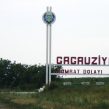
Another ‘Damn Thing in the Balkans’—the Russian Cossacks Come to Comrat
Publication: Eurasia Daily Monitor Volume: 10 Issue: 51
By:

The appearance of a detachment of Russian Cossacks in Moldova’s Autonomous Territorial Unit of Gagauzia has not only unsettled some residents there but also spotlights Moscow’s efforts to use the Christian Turkic Gagauz people—alongside Transnistria—against the Moldovan government in Chisinau. The Cossacks’ presence incites a dangerous game that could lead to the breakup of this small Eastern European country and spark serious internal conflicts that the Russian government would likely move to exploit.
Two weeks ago, ethnic Russian Cossacks appeared in Gagauzia. They have sought formal recognition as a public organization from the republic’s justice ministry, named several members of the National Assembly as senior officers and announced their intention to “preserve the motherland” by whatever means might be necessary (gagauzinfo.md/index.php?newsid=6982).
Not surprisingly, many Gagauz loyal to the Moldovan state—particularly some veterans of the Transnistria War (March–July 1992)—were outraged by what they saw as the latest threat to the territorial integrity of their country and spoke out against it. Their complaints in turn prompted the autonomous region’s Presidium of the National Assembly last Friday to issue a stinging denunciation of those who had criticized the appearance of the Russian Cossacks in the local capital of Comrat as “a provocation” planned by “extremist forces intolerant of the national minorities and numerically small peoples of Moldova” (gagauzinfo.md/index.php?newsid=7100).
The Presidium statement expressed anger and surprise at the negative reaction from those groups who had fought against Russian forces in Transnistria. Claims by veterans groups that the Russian Cossacks who have come to Comrat “threaten the independence, security and territorial integrity of the country are strange at the very least,” the parliamentary leadership said.
“The Presidium of the National Assembly evaluates this demarche of a group of veterans of the Dniestria war [sic] as a provocation planned by extremist groups” and as a challenge to the Gagauz people “who stand for the defense of the statehood of Moldova and oppose any kind of unionist aspirations” between Moldova and Romania. “The [Cossack] Budzhak battalion, which has been created on the territory of Gagauzia, has arisen not for war with Moldova but for the defense of the collective and individual rights and authority of the Gagauz people, which alongside the Moldovans are a state-forming element of the country.”
The declaration then suggested that it is the critics of the appearance of the Russian Cossacks in Gagauzia rather than the Cossacks and their local supports who are creating the conditions for “the liquidation of the territorial integrity of the country, the exacerbation of the situation there and the loss of security.” The Gagauzian legislature argued that the Russian Cossack unit has specified that “one of its goals is the defense of the statehood of the Republic of Moldova.”
The Presidium statement concluded by expressing the hope that “all people of good will” and all the multi-national people of Moldova” will join it in condemning the extremist attacks of the ‘pseudo-patriots’” who in fact, by their support for expanding ties with Romania, are a real threat to the independence and territorial integrity of the republic and of the Moldovan and Gagauz people.
As so often happens, the real situation is almost the exact opposite of the way in which the statement of the Presidium of the Gagauz parliament describes it. First of all, the appearance of yet another armed group in a place that is currently one of the most heavily-armed populations in Europe is almost an invitation to the kind of violence that could lead to instability that Chisinau would find difficult to contain.
Second, the arrival of a Russian Cossack unit in Gagauzia is about far more than the fate of that 200,000-strong autonomous region. It is about Transnistria in the first instance. Amid more pressure on Chisinau from a new direction, pro-Moscow officials in Tiraspol clearly hope to be able to extract more concessions from the central government or even force it to accept as a fait accompli the exit of Transnistria from Moldova, a step that would entail tragic consequences for the entire region.
And third, as any number of sources including the New York Times this past Sunday have noted, Russian Cossacks can do things that Russian officials cannot, thus giving Moscow a useful tool to promote its interests that it can disown should that at some point be required. If the Cossacks do destabilize the situation, Russian officials can use that as leverage against Chisinau either to push the Kremlin’s agenda on Transnistria or to cause the Moldovan government to turn toward Moscow rather than the West. If the Cossacks create a problem the Russian government cannot exploit, then Moscow can declare that it has nothing to do with their actions.
The situation in a place most people have never heard could thus become important. As such, it is but the latest example of the frequent prognostication that “some damn fool thing in the Balkans”—first prophetically uttered by German Chancellor Otto von Bismarck in the late 19th century—will trigger broader problems for Europe and the world.




